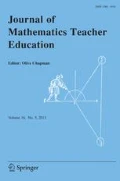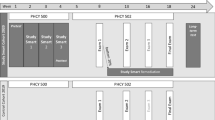Abstract
To anticipate and respond to the diverse ways of reasoning students with disabilities use to make sense in inclusive mathematics classrooms, special educators require a deep understanding of a diverse array of student thinking. Unfortunately, historic and contemporary data suggest that opportunities for special educators to develop this knowledge prior to classroom teaching are diminutive. Further inquiry is needed into pre-service experiences that might support growth in teachers’ knowledge. We present results from a US-based semester-long course grounded in neurodiversity and students’ mathematical thinking designed to improve 20 special educators’ pedagogical content knowledge. Qualitative and quantitative analyses were conducted to determine how the pre-service teachers anticipated students’ diverse mathematical thinking before and after experience in the course along with their propensity to adapt problems to respond to diversity during instruction. Furthermore, the pre-test to post-test changes in pre-service teachers’ anticipations of students’ problem-solving strategies and adaptations of problems were statistically significant. Implications for teacher preparation and future research are shared.
Similar content being viewed by others
Notes
All 20 study participants were enrolled in the 4-year program sequence.
References
Ball, D. L., Thames, M. H., & Phelps, G. (2008). Content knowledge for teaching: What makes it special? Journal of Teacher Education, 59(5), 389–407.
Bascom. (2012). Loud hands: Autistic people, speaking. Autistic Self Advocacy Network.
Baxter, J. A., Woodward, J., & Olson, D. (2001). Effects of reform-based mathematics instruction on low achievers in five third- grade classrooms. The Elementary School Journal, 101(5), 529–547.
Baxter, J., Woodward, J., Voorhies, J., & Wong, J. (2002). We talk about it, but do they get it? Learning Disabilities Research and Practice, 17(3), 173–185. https://doi.org/10.1111/1540-5826.00043
Blanton, L. P., Pugach, M. C., & Florian, L. (2011). Preparing general education teachers to improve outcomes for students with disabilities (Issue March). http://www.ncld.org/wp-content/uploads/2014/11/aacte_ncld_recommendation.pdf
Bottge, B. A., Heinrichs, M., Zara Dee Mehta, M., & Hung, Y. H. (2002). Weighing the benefits of anchored math instruction for students with disabilities in general education classes. Journal of Special Education, 35(4), 186–200. https://doi.org/10.1177/002246690203500401
Brock, M. E., Huber, H. B., Carter, E. W., Juarez, A. P., & Warren, Z. E. (2014). Statewide assessment of professional development needs related to educating students with autism spectrum disorder. Focus on Autism and Other Developmental Disabilities, 29(2), 67–79. https://doi.org/10.1177/1088357614522290
Carpenter, T. P., Fennema, E., Franke, M. L., Levi, L., & Empson, S. B. (2015). Children’s mathematics: Cognitively guided instruction. Heinemann.
Chodura, S., Kuhn, J. T., & Holling, H. (2015). Interventions for children with mathematical difficulties: A meta-analysis. Zeitschrift Fur Psychologie/journal of Psychology, 223(2), 129–144. https://doi.org/10.1027/2151-2604/a000211
Cooc, N. (2019). Teaching students with special needs: International trends in school capacity and the need for teacher professional development. Teaching and Teacher Education, 83, 27–41. https://doi.org/10.1016/j.tate.2019.03.021
Creswell, J. W. (2013). Qualitative inquiry & research design: Choosing among five approaches (3rd edn.). Sage.
DeMonte, J. (2013). High-quality professional development for teachers high-quality professional development for teachers: Supporting teacher training to improve student learning.
Empson, S. B. (2003). Low-performing students and teaching fractions for understanding: An interactional analysis. Journal for Research in Mathematics Education, 34(4), 305–343.
Fazio, L. K., & Siegler, R. S. (2013). Microgenetic learning analysis: A distinction without a difference. Human Development, 56, 52–58. https://doi.org/10.1159/000345542
Ferguson, D. L. (2008). International trends in inclusive education: The continuing challenge to teach each one and everyone. European Journal of Special Needs Education, 23(2), 109–120. https://doi.org/10.1080/08856250801946236
Florian, L. (2009). Preparing teachers to work in ‘schools for all.’ Teaching and Teacher Education, 25, 533–534. https://doi.org/10.1016/j.tate.2009.02.004
Gersten, R., Chard, D. J., Jayanthi, M., Baker, S. K., Morphy, P., & Flojo, J. (2008). Mathematics instruction for students with learning disabilities or difficulty learning mathematics: A synthesis of the intervention research. https://doi.org/10.1177/0143034393141003
Göransson, K., Hellblom-Thibblin, T., & Axdorph, E. (2016). A conceptual approach to teaching mathematics to students with intellectual disability. Scandinavian Journal of Educational Research, 60(2), 182–200. https://doi.org/10.1080/00313831.2015.1017836
Grbich, C. (2007). Qualitative data analysis: An introduction. Sage Publications, Inc.
Hord, C., Tzur, R., Xin, Y. P., Si, L., Kenney, R. H., & Woodward, J. (2016). Overcoming a 4th grader’s challenges with working-memory via constructivist-based pedagogy and strategic scaffolds: Tia’s solutions to challenging multiplicative tasks. Journal of Mathematical Behavior, 44, 13–33. https://doi.org/10.1016/j.jmathb.2016.09.002
Hunt, J., & Silva, J. (2020). Emma’s negotiation of number: Implicit intensive intervention. Journal for Research in Mathematics Education, 51(3), 334–360.
Hunt, J. H., Westenskow, A., Silva, J., & Welch-Ptak, J. (2016). Levels of participatory conception of fractional quantity along a purposefully sequenced series of equal sharing tasks: Stu's trajectory. The Journal of Mathematical Behavior, 41, 45–67.
Hunt, J. H., Martin, K., Khounmeuang, A., Silva, J., Patterson, B., & Welch-Ptak, J. (2020). Design, development, and initial testing of asset-based intervention grounded in trajectories of student fraction learning. Learning Disability Quarterly, 0731948720963589.
Jackson, H. G., & Neel, R. S. (2006). Observing mathematics: Do students with EBD have access to standards-based mathematics instruction? Education & Treatment of Children, 29(4), 593–614.
Karp, K. (2013). The invisible 10%—Preparing teachers to teach mathematics to students with special needs [Keynote presentation of the Judith Jacobs Lecture]. Annual Meeting of the Association of Mathematics Teacher Educators.
Krawec, J., & Montague, M. (2014). The role of teacher training in cognitive strategy instruction to improve math problem solving. Learning Disabilities Research and Practice, 29(3), 126–134.
Kroesbergen, E. H., & van Luit, J. E. H. (2003). Mathematics interventions for children with special educational needs: A meta-analysis. Remedial and Special Education, 24(2), 97–114.
Lambert, R., & Tan, P. (2017). Conceptualizations of students with and without disabilities as mathematical problem solvers in educational research: A critical review. Education Sciences, 7(2), 51–68. https://doi.org/10.3390/educsci7020051
Leech, N. L., & Onwuegbuzie, A. J. (2007). An array of qualitative data analysis tools: A call for data analysis triangulation. School Psychology Quarterly, 22(4), 557–584.
Lewis, K. E., & Fisher, M. B. (2016). Taking stock of 40 years of research on mathematical learning disability: Methodological issues and future directions. Journal for Research in Mathematics Education, 47(4), 338–371.
Lynch, S. D., Hunt, J. H., & Lewis, K. E. (2018). Productive struggle for all: Differentiated instruction. Mathematics Teaching in the Middle School, 23(4), 194–201.
Martinez, E. A., & Hallahan, D. P. (2000). Some thoughts on international perspectives in special education, with special attention to the research-to-practice gap. Exceptionality, 8(4), 305–311. https://doi.org/10.1207/s15327035ex0804_9
McLaughlin, M. J., Dyson, A., Nagle, K., Thurlow, M., Rouse, M., Hardman, M., Norwich, B., Burke, P. J., & Perlin, M. (2006). Cross-cultural perspectives on the classification of children with disabilities: Part II. Implementing classification systems in schools. Journal of Special Education, 40(1), 46–58. https://doi.org/10.1177/00224669060400010501
National Assessment of Educational Progress. (2018). National center for education statistics. U.S. Department of Education. IES.
National Council of Teachers of Mathematics (NCTM). (2000). Principles and standards for school mathematics. National Council of Teacher of Mathematics.
National Council of Teachers of Mathematics (NCTM) (Ed.). (2020). Catalyzing change in early childhood and elementary mathematics: Initiating critical conversations. National Council of Teacher of Mathematics.
Peltenburg, M., van den Heuvel-Panhuizen, M., & Robitzsch, A. (2012). Special education students’ use of indirect addition in solving subtraction problems up to 100—A proof of the didactical potential of an ignored procedure. Educational Studies in Mathematics, 79, 351–369. https://doi.org/10.1007/s10649-011-9351-0
Powell, A., Nielsen, N., Butler, M., Buxton, C., Johnson, O. J., Ketterlin-Geller, L., Stiles, J., & McCulloch, C. (2018). The use of theory in research on broadening participation in preK-12 STEM education: Information and guidance for prospective DRK-12 grantees.
Program for International Student Assessment. (2018). Organization for Economic Cooperation and Development.
RAND. (2012). Teachers matter: Understanding teachers’ impact on student achievement. RAND Corporation.
Robertson, S. M., & Ne’eman, A. D. (2008). Autistic acceptance, the college campus, and technology: Growth of neurodiversity in society and academia. Disability Studies Quarterly, 28(4).
Rosas, C., & Campbell, L. (2010). Who’s teaching math to our most needy students? A descriptive study. Teacher Education and Special Education, 33(2), 102–113. https://doi.org/10.1177/0888406409357537
Sheppard, M. E., & Wieman, R. (2020). What do teachers need? Math and special education teacher educators’ perceptions of essential teacher knowledge and experience. Journal of Mathematical Behavior, 59. https://doi.org/10.1016/j.jmathb.2020.100798
Snyder, T. D., de Brey, C., & Dillow, S. A. (2019). Digest of education statistics 2018 (NCES 2020–009).
Stevens, E. A., Rodgers, M. A., & Powell, S. R. (2018). Mathematics interventions for upper elementary and secondary students: A meta-analysis of research. Remedial and Special Education, 39(6), 327–340. https://doi.org/10.1177/0741932517731887
Tan, P., & Kastberg, S. (2017). Calling for research collaborations and the use of dis/ability studies in mathematics education. Journal of Urban Mathematics Education, 10(2), 25–38.
Tomlinson, C. A. (2001). How to differentiate instruction in mixed-ability classrooms (2nd edn.). Association for Supervision and Curriculum Development.
World Health Organization. (2011). World report on disability. https://doi.org/10.1111/j.1741-1130.2011.00320.x
Zhang, D., & Xin, Y. P. (2012). A follow-up meta-analysis for word-problem-solving interventions for students with mathematics difficulties. The Journal of Educational Research, 105(5), 303–318.
Author information
Authors and Affiliations
Corresponding author
Additional information
Publisher's Note
Springer Nature remains neutral with regard to jurisdictional claims in published maps and institutional affiliations.
Rights and permissions
About this article
Cite this article
Hunt, J.H., Martin, K., Patterson, B. et al. Special educators’ knowledge of student mathematical thinking. J Math Teacher Educ 25, 581–598 (2022). https://doi.org/10.1007/s10857-021-09508-1
Accepted:
Published:
Issue Date:
DOI: https://doi.org/10.1007/s10857-021-09508-1




